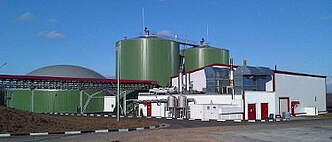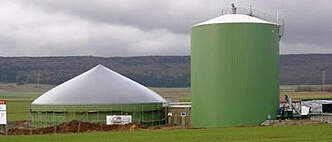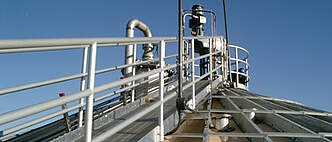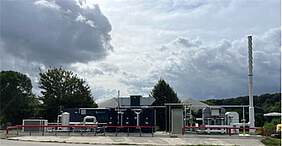On July 15th, the first cubic meters of biomethane were injected into the Essen Kettwig natural gas network from the Im Brahm biogas plant. The conversion of this plant from electricity to biomethane production is our latest project with BioEnergie Ruhrtal, a collaboration that began 20 years ago. We congratulate the Im Brahm family on this achievement and are glad to support and grow with them through the challenges and opportunities in Germany's biogas sector.
Our cooperation began in 2005 with a biogas plant on their pig farm. Before this, leftover food, fats, oils, and other kitchen waste were processed and fed to pigs. However, new EU legislation regarding animal by-products prohibited their use as pig feed. Biogas presented an alternative use for kitchen waste, turning it into energy and making the business sustainable. The first 190 kW plant, connected to the existing kitchen waste pretreatment facility, began operations in 2005. The input substrates included pig manure, kitchen waste, and horse dung and plant initially had 2 concrete digesters, 1,205 m³ each.
In 2007, an additional CHP unit was added to expand the plant. By 2010, an additional concrete digester and a third engine were installed to handle more kitchen waste. Than another engine in 2011. The heat produced in cogeneration was used for internal processes like pasteurization and digester heating, as well as for heating surrounding buildings, nearby castle with a hotel and grain drying.
In further expansions, storage tank with gas holder roof (6,000 m³) was added in 2013 and digestate separation in 2016. Biogas plant currently produces about 2,3 Mio Nm³ of biogas annually (200 Nm³/h) with the plan to expand in the following years. Operational temperature is thermophilic.
Since 2022, Krieg & Fischer Ingenieure has been contracted by BioEnergie Ruhrtal to plan the construction of a biogas processing plant and its integration into the existing facilities.
This has been the task for our engineer, Mr. Tobias Eckhof:
“As it is always with building in existing plants, there is maybe not the one smoothest solution that you would take on a greenfield project, but it has to be seen where new equipment can be integrated into the running system without changing too much. Still, some standard equipment on agricultural biogas plants, like the injection of air for desulphurization had to be changed to meet raw gas quality expectations (we now have an oxygen generator for that purpose). On the positive side, working with long-term clients provides a foundation of trust, which facilitates good cooperation and understanding. Additionally, this client is also operator of the plant. An experienced operator/owner knows very well existing problems/limits of the plant which are very useful to know when planning an addition to it. They can also handle many tasks themselves, reducing the need for a complicated tender process for minor work.”
Switching from electricity to biomethane production has become everyday work for Krieg & Fischer team. Our projects are always carried out in accordance with the German safety standards for biogas plants as well as with all the regulations and rules required in permission process (TA-Luft, GasNZV) and connection to the gas grid (DVGW rules). This sometimes involves intense and long permission process, with new laws to comply with.
The construction is now completed and this biomethane plant is now in the test run. For the needs of the process and continuous heat supply for the fermentation and surrounding consumers, feasible solution is that part of the biogas is still utilized in the existing CHPs (the own electricity for gas upgrading has also a positive effect on methane revenue), with preference of the Upgrading system. Heat from the gas upgrading is also recovered and integrated in that process.
This plant will supply 11 million kWh of biomethane per year to the natural gas network.
Congratulations to everyone involved, and we look forward to the next steps with BioEnergie Ruhrtal!



